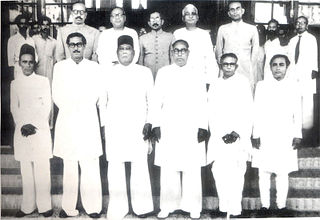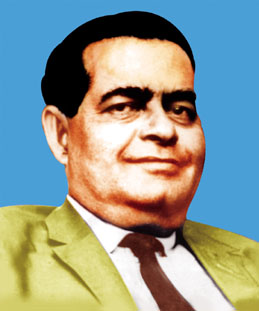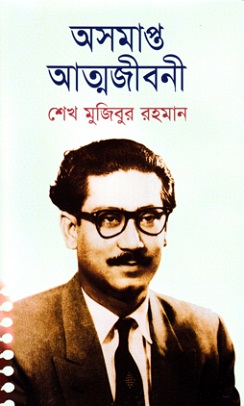Related Research Articles

Sheikh Mujibur Rahman, popularly known by the honorific prefix Bangabandhu, was a Bangladeshi politician, revolutionary, statesman, activist and diarist. As a politician, Mujib had held continuous positions either as Bangladesh's president or as its prime minister from April 1971 until his assassination in August 1975. Mujib successfully led the Bangladeshi independence movement and restored the Bengali sovereignty after over two centuries following the Battle of Plassey in 1757, for which he is honoured as the 'Father of the Nation' in Bangladesh. In 2011, the fifteenth constitutional amendment in Bangladesh referred to Sheikh Mujib as the Father of the Nation who declared independence; these references were enshrined in the fifth, sixth, and seventh schedules of the constitution. His Bengali nationalist ideology, socio-political theories, and political doctrines are sometimes called Mujibism.

The Bangladesh Awami League, often simply called the Awami League or AL, is one of the major political parties in Bangladesh. The oldest existing political party in the country, Awami League successfully lead Bangladesh to the independence. One of the two most dominant parties in the country, along with its archrival Bangladesh Nationalist Party, it has been the ruling party since 2009, and has since been described as authoritarian.

Huseyn Shaheed Suhrawardy was a Pakistani Bengali barrister and politician. In Bangladesh, Suhrawardy is remembered as a pioneer of Bengali civil rights movements, later turned into Bangladesh independence movement, and the mentor of Bangladesh's founding leader Sheikh Mujibur Rahman. He is also remembered for his performance as the Minister for Civil Supply during the Bengal famine of 1943. In India, he is seen as a controversial figure; directly responsible for the 1946 Calcutta Killings, for which he is often referred as the "Butcher of Bengal" in West Bengal.
Shah Azizur Rahman was a Bangladeshi politician who served as the prime minister of Bangladesh. However, he was the subject of considerable controversy for his collaboration with the Pakistan Army against the struggle for the independence of Bangladesh.
The Agartala Conspiracy Case was a sedition case in Pakistan during the rule of Ayub Khan against Awami League, brought by the government of Pakistan in 1968 against Sheikh Mujibur Rahman, the then leader of the Awami League and East Pakistan, and 34 other people.

The United Front was a coalition of political parties in East Bengal which contested and won Pakistan's first provincial general election to the East Bengal Legislative Assembly. The coalition consisted of the Awami Muslim League, the Krishak Praja Party, the Ganatantri Dal and Nizam-e-Islam. The coalition was led by three major Bengali populist leaders- A. K. Fazlul Huq, Huseyn Shaheed Suhrawardy and Maulana Bhashani. The election resulted in a crushing defeat for the Muslim League. Veteran student leader of East Pakistan Khaleque Nawaz Khan defeated sitting Prime Minister of East Pakistan Mr. Nurul Amin in Nandail Constituency of Mymensingh district and created history in political arena. Nurul Amin's crushing defeat to a 27 years old young Turk of United Front effectively eliminated the Muslim League from political landscape of the then East Pakistan with United Front parties securing a landslide victory and gaining 223 seats in the 309-member assembly. The Awami League emerged as the majority party, with 143 seats.

Bengali nationalism is a form of nationalism that focuses on Bengalis as a single ethnicity by rejecting imposition of other languages and cultures while promoting its own in Bengal. Bengalis speak the Bengali language and mostly live across Bangladesh and the Indian states of West Bengal, Tripura and Assam. Bengali nationalism is one of the four fundamental principles according to the Constitution of Bangladesh and was the main driving force behind the creation of the independent nation state of Bangladesh through the 1971 liberation war. Bengali Muslims make up the majority (90%) of Bangladesh's citizens (Bangladeshis), and are the largest minority in the Indian states of Assam (29%) and West Bengal (27%), whereas Bengali Hindus make up the majority (60%) of India's citizens (Indians) in Indian state of West Bengal, and are the largest minority in the Indian states of Assam (28%) and Jharkhand (8%) and the independent state of Bangladesh (8%).

Ataur Rahman Khan was a Bangladeshi lawyer, politician and writer, and served as Chief Minister of East Pakistan from 1 September 1956 – March 1958, and as the Prime Minister of Bangladesh from 30 March 1984 to 9 July 1986.

Tofazzal Hossain, popularly known as Manik Miah, was a Pakistani Bengali journalist and politician. He served as the founding editor of The Daily Ittefaq. He wrote the editorial Rajnoitik Moncho. Most of his newspaper's journalists were considered leftist, as Miah followed the pattern of Awami League. According to journalist and editor of Shongbad Bozlur Rahman, Awami activists followed his editorial more than any actual decision of a meeting. He was a close associate of the founder of Bangladesh, Sheikh Mujibur Rahman.

The 7th March Speech of Bangabandhu, or the 7/3 Speech, was a public speech given by Sheikh Mujibur Rahman, the Founding Father of Bangladesh on 7 March 1971 at the Ramna Race Course in Dhaka to a gathering of over one million (1,000,000) people. It was delivered during a period of escalating tensions between East Pakistan and the powerful political and military establishment of West Pakistan. In the speech, Bangabandhu informally declared the independence of Bangladesh, proclaiming: "The struggle this time, is a struggle for our liberty. The struggle this time, is a struggle for our independence." He announced a civil disobedience movement in the province, calling for "every house to turn into a fortress".

The 1969 East Pakistan uprising was a democratic political uprising in East Pakistan. It was led by the students backed by various political parties such as the Awami League and National Awami Party and specially their student wings against Muhammad Ayub Khan, the president of Pakistan in protest of the military rule, political repressions, Agartala Conspiracy Case and the incarceration of Sheikh Mujibur Rahman and other Bengali nationalists.

Abdul Hamid Khan Bhashani, often shortened as Maulana Bhashani, was a Bengali politician. His political tenure spanned the British colonial India, Pakistan and Bangladesh periods. Maulana Bhashani was popularly known by the honorary title Mozlum Jananeta for his lifelong stance advocating for the poor. He gained nationwide mass popularity among the peasants and helped to build the East Pakistan Peasant Association. Owing to his political leaning to the left, often dubbed Islamic Socialism, he was also called 'The Red Maulana'. He is considered as one of the main pillars of Bangladeshi independence of 1971.

The Unfinished Memoirs is the autobiography by Sheikh Mujibur Rahman, Father of the nations of Bangladesh.
Yar Mohammad Khan was one of the founders and the first treasurer of the Bangladesh Awami League, the main political party that eventually led Bangladesh's struggle for independence against the West Pakistan regime.

Awami League, known as Awami Muslim League before 1955, was an East Pakistan-based Pakistani political party founded by Huseyn Shaheed Suhrawardy in February 1950. Pir of Manki Sharif and Khan Ghulam Mohammad Khan from the North-West Frontier Province (NWFP) joined it soon afterwards.
Amjad Hossain was a Bangladeshi statesman and freedom fighter. Amjad Hossain is regarded as one of the influential and political figures in Pabna during Liberation War of Bangladesh in 1971, due to his leadership and organizing capability, he united the various political and civil forces of Bangladeshi nationalism in 1971.
Ashab Uddin Ahmad was a Bangladeshi writer, educator and politician. He was a member of the East Bengal Legislative Assembly for the United Front, and a Communist activist. In 2005, he was posthumously awarded the Ekushey Padak, one of the highest civilian awards in Bangladesh, for his contributions to literature, which include 24 published books in Bengali and English.

The Bengal Provincial Muslim League (BPML) was the branch of the All India Muslim League in the British Indian province of Bengal. It was established in Dhaka on 2 March 1912. Its official language was Bengali. The party played an important role in the Bengal Legislative Council and in the Bengal Legislative Assembly, where two of the Prime Ministers of Bengal were from the party. It was vital to the creation of the Dominion of Pakistan, particularly after its election victory in 1946.
The non-cooperation movement of 1971 was a historical movement in then East Pakistan by the Awami League and the general public against the military government of Pakistan in March of that year. After the announcement of the suspension of the session of the National Assembly of Pakistan on 1 March, the spontaneous movement of the people started, but officially on the call of Sheikh Mujibur Rahman, the non-cooperation movement started on 2 March and continued until 25 March. The movement lasted for a total of 25 days.
Anwara Khatun was a Bengali politician and member of provincial assembly.
References
- ↑ "Kagmari Conference". The Daily Star. 2007-11-13. Retrieved 2018-12-17.
- ↑ "Seeds of independence sown at Kagmari Confce: speakers". New Age. Retrieved 2018-12-17.
- ↑ "'Conspiracy on to tarnish image of Bhasani'". The New Nation. Retrieved 2018-12-17.
- 1 2 Rahman, Bilkis. "Kagmari Conference". Banglapedia. Retrieved 17 December 2018.